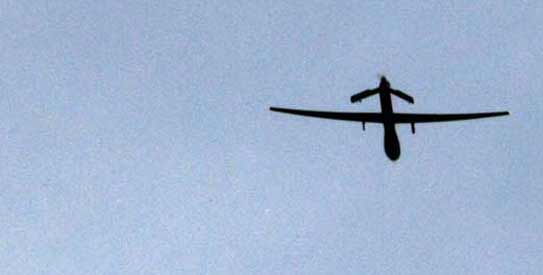
ISLAMABAD: Pakistan had no confirmation on Friday that al Qaeda's chief of operations in the country had been killed in a recent drone strike in the northwestern tribal region, as reported by American officials.
Abu Hafs al Shahri, a Saudi national who had been serving as the senior figure in al Qaeda's central command, was the target of the drone strike which occurred within the last few days, two US officials said on Thursday.
“We have no knowledge of that,” said Pakistan military spokesman Major Gen. Athar Abbas.
Intelligence officials operating in the tribal regions near the Afghan border also had no information on al Shahri.
“We have neither heard of this man operating in this region, nor can we confirm his death,” said one.
While US officials declined to provide precise details, the only drone strike this month occurred on Sunday when a US drone targeted a militant compound near the town of Mir Ali in North Waziristan that killed at least three suspected militants.
If confirmed, Al Shahri would be the sixth senior al Qaeda figure killed by either US or Pakistani forces in Pakistan since May with the death of their chief Osama bin Laden in a secret US raid on Abbottabad.
Two Pakistani intelligence officials said two of the dead in that strike were Pakistani militants, but had no information about the third target. Another intelligence official said he was of Arab origin, but had no further details.
Taliban militants were not immediately available for comments.
Militants usually quickly bury their dead after drone strikes, making it difficult to verify that US or Pakistani operations had succeeded.
The unruly, mountainous northwest region is hard to access as well.
As al Qaeda's Pakistan operations chief, one of the US officials said, al Shahri's responsibilities included coordinating the activities of al Qaeda's depleted central leadership with Pakistan's principal network of Taliban militants, known as the TTP.
Another senior al Qaeda leader, Younis al Mauritani, was recently captured in Pakistan's tribal areas in a joint operation staged by US and Pakistani security forces.
That operation was hailed by Washington and Islamabad as an example of strong counter-terrorism cooperation.
Those comments suggested the United States and Pakistan had put behind them bitterness caused by the unilateral raid that killed bin Laden.
But there are signs of new strains in the alliance.
The US warning on militants based in Pakistan, blamed by Washington for this week's attack on the US Embassy in Kabul, works against counter-terrorism cooperation between the two allies, the Pakistan Foreign Ministry said on Thursday.
It was referring to comments by US Defence Secretary Leon Panetta that Washington would do whatever it takes to defend American forces in Afghanistan from Pakistan-based militants.













































Dear visitor, the comments section is undergoing an overhaul and will return soon.